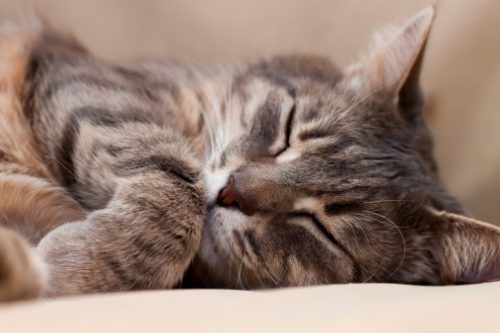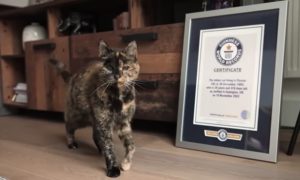 Feline leukemia (FeLV) is a contagious disease in cats, secondary only to trauma as the number one cause of death in felines. In fact, 85% of persistently infected cats will die within 3 years of diagnosis. With that said, not every cat who encounters the virus becomes affected – up to 70% of exposed kitties are able to shed the virus on their own and resist infection.
Feline leukemia (FeLV) is a contagious disease in cats, secondary only to trauma as the number one cause of death in felines. In fact, 85% of persistently infected cats will die within 3 years of diagnosis. With that said, not every cat who encounters the virus becomes affected – up to 70% of exposed kitties are able to shed the virus on their own and resist infection.
How do Cats Get Feline Leukemia?
The virus is most commonly transmitted through direct contact with an infected cat, usually by grooming, shared litter boxes, or it’s passed in utero or through the mother’s milk. Outdoor cats that get into fights can also spread the disease through bites, scratching and spitting.
Common Warning Signs
The symptoms of Feline Leukemia don’t always express themselves right away. For that reason, you should have any new cat entering your home tested for it.
FeLV often attacks kittens that are less than four months old. While some infected kittens can free their bodies from the virus and do not become ill, others can be permanently infected but may not display any obvious sign of the condition for many years. These kittens are usually infected by their mothers who transmitted the disease to their young through milk or saliva. Nevertheless, older healthy cats are commonly immune to FeLV.
Symptoms of feline leukemia usually include the following: fever, anemia, weight loss, swollen lymph nodes, persistent diarrhea, upper respiratory infections, and/or sore gums and mouth. Aside from that, infected cats can also experience recurring ear and skin infections, immune-mediated haemolytic anemia, nervous system problems, reduced number of clotting cells, decreased number of white blood cells, and tumors.
Diagnosis and Treatment
Your vet can diagnose FeLV using a simple blood test. The test is highly sensitive and it’s important to remember, again, that some cats will shed the virus on their own. So it’s recommended that you repeat the test within a few months to confirm the cat is still infected.
There is no known cure for Feline Leukemia. Some cats with the disease become seriously ill and die within 3 years of diagnosis. However, regular veterinary check-ups and good preventive health care can help keep these cats feeling well for some time. Death is often caused by a secondary infection because the infected cats are not capable of fighting off bacteria and viruses.
Treatment generally varies according to the symptoms manifested by kitty. For instance, anemic cats are given blood transfusions, those with infections are given antibiotics to get rid of troublesome bacteria that worsen the anemia, and dehydrated cats or those who refuse to eat are given fluids and nutritional supplements. In addition, vets will provide supportive dental care for cats with gums and mouth disease, certain abdominal injections for those with bone marrow infection, and chemotherapy for cats with tumors.
How to Care for a Cat with Feline Leukemia
Cats that are positive for Feline Leukemia should be kept indoors, to prevent spreading the disease and worsening the cat’s condition. They should be spayed or neutered and kept in a low-stress environment. They should be fed a high quality diet and kept extremely clean. Remember, FeLV positive cats are less able to avoid secondary infections. This includes washing their food and water bowls every day to avoid contamination, trimming nails, and keeping their bedding clean.
FeLV positive kitties should be regularly checked by a veterinarian. Pet owners should be keenly aware of any changes in the cat’s behavior, appetite, and energy level as this could indicate a progression of the disease.
If you have other cats in your home that are not infected with FeLV, have them vaccinated against the disease immediately. Keep separate food, water, and litter box for the infected cat. Avoid bringing any new cats into your home.
But, most importantly, keep your Feline Leukemia positive cat happy and comfortable.





















